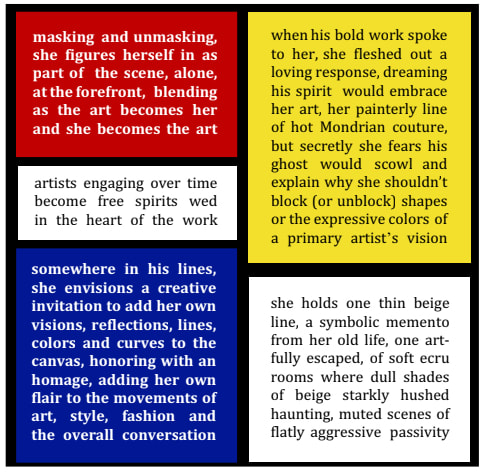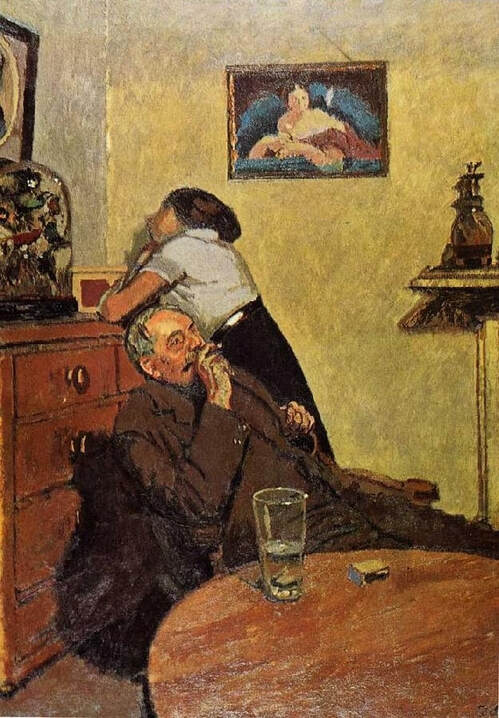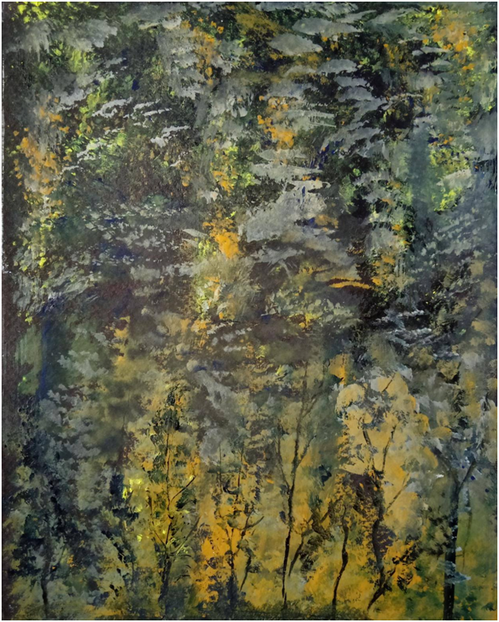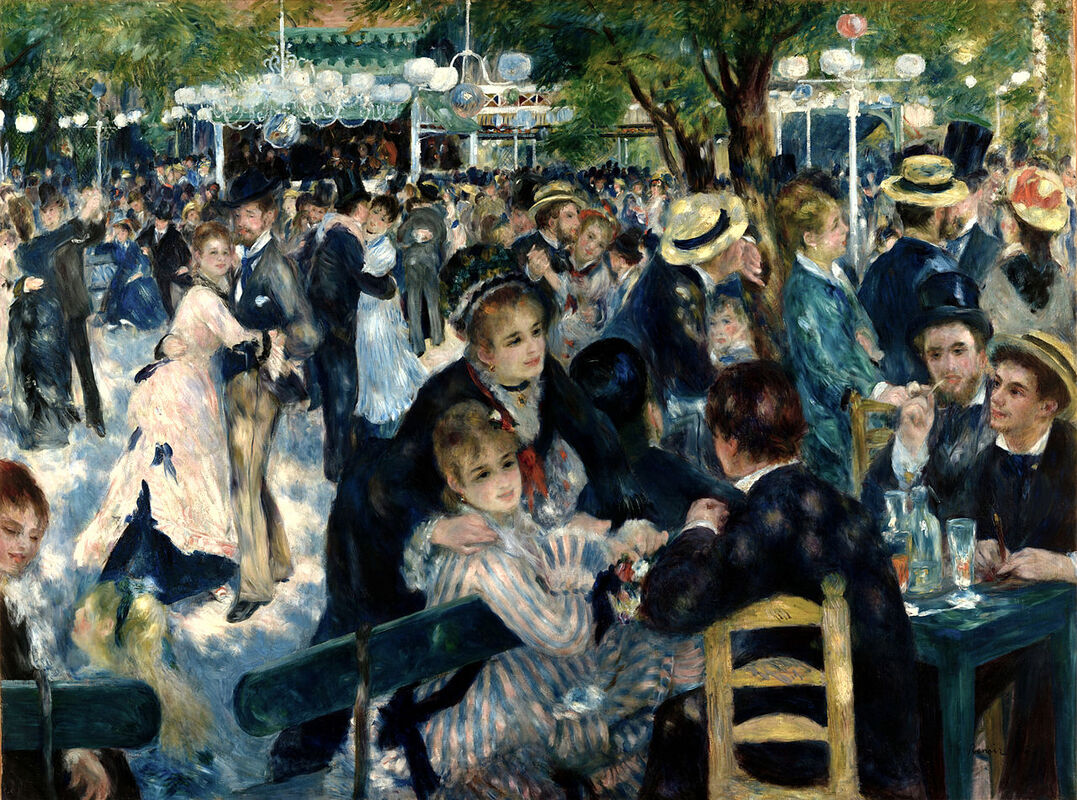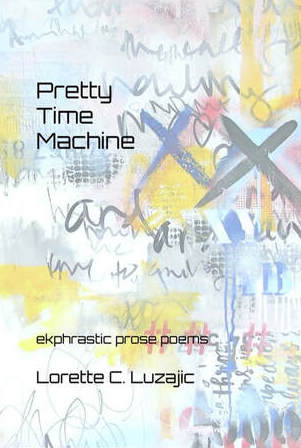|
Art Becomes Her Linda Eve Diamond The specific painting by Caroline Dechamby that inspired this poem is Adhesif. View it here. Linda Eve Diamond’s poetry has been honoured with several awards, including Grand Prize Award in the Artists Embassy International Dancing Poetry Contest “for exceptional poetry that inspires dance and for furthering intercultural understanding and peace through the universal language of the arts.” Her poetry has been published by numerous literary journals and websites. Find her poetry collections, selected poems and more at http://LindaEveDiamond.com.
0 Comments
Untitled #1 New meaning given to the blind leading the blind in this case the barely functional leading the less functional Part of a motley parade on asylum grounds all the patients tricked out for Halloween Down’s adults in loose formation following a determined leader, who know where? The leader, a woman, holding the slowest of slow learners one of the terminally confused with false moustache ragged rude costume permanently unfocused eyes Is this the Great Escape? Even if they made it off the grounds Where would they go? What would they do? Who would save them? Untitled #2 If hell has a take a number system where you will wait in a common room for an interview That waiting area would look like this: An asylum morning room with scuffed industrial strength tile floor molded plastic chairs for the young men endlessly rocking for those gone-eyed humans hugging themselves as they compulsively sway, moaning as they go back and forth back and forth And chairs for the men who balance them on their feet as they lie on the floor maniacally laughing even as the inevitable chair fall that splits swollen lips And a chair for the woman of no discernible age wearing a pressed dress standing guard over the little red wagon the kind of wagon kids use to gather toys and dirt and the refuse of life So much depends on that little red wagon that signifies no more than it actually is Chances are where you wait that your number will never be called Untitled #3 They could be the wicker women, elderly crones dressed in mismatched clothes: too small winter-weight jackets, scarves and hats that cover their thinning, unwashed hair, plastic dime store masks to hide who they really are. They need no dress up outfits, no makeup to effect their look, they are witch-like normally, would have been burned or drowned in an earlier age instead of warehoused as they are now. Are five crones on the way to an Autumn Rite where the Wicker Man is waiting, the one that has been built on a common ground field between asylum dorms, built far enough away from human habitation to prevent residual flames from unintended ignitions once the offering of the man has begun As they watch the flames, their eyes contain memories of rituals past: of the festering heat, cleansed flesh, victuals flensed to the bone. None of them are allowed the gift of fire. Untitled #4 “This is not a dream. This is really happening.” Rosemary’s Baby Which movie was it? Where Death was a man with white grease painted face able to be two places at once. Was the voice on the phone, across town, a man is speaking to and Death is the man with the glassine eyes and sinister smile standing next to him as he listens to the voice from elsewhere. This is one cocktail party he will never forget like the club date he played where the white faced man sits front row in smoky venue and in the back row as well. No matter where you go he is there before you and after, smiling as if he knows something you will never know, something you will never understand like how you came to be in this field with this white faced person this person in a clean white sheet wearing a death mask and posing for a portrait holding a small shopping bag for candy treats instead of a scythe This is a picture that you you can never unsee once you have viewed it every night from now on in the dark room of your dreams Untitled #5 “We’re not dreaming now.” Eyes Wide Shut So many of the costumed men and women look as if they’d been to the same costume rental Tom Cruise used in Eyes Wide Shut Where they rented a sheath dress or a cape and cheap eye covering, Lone Ranger masks and went somewhere after the rental they were never meant to be Stood waiting on nearly frozen asylum grounds or under suburban Jersey sidewalk trees or on lawns for a Satanic ritual to begin All of them standing inert, expectant, in the fading, overcast daylight for shadows to become night They may be waiting still. Untitled #6 They are the handmaidens of a witch’s coven, cast out of the fold and onto the streets in their chiffon aprons and street clothes, their made-in Arts & Crafts wands, colored paper stars affixed to the end of sticks, their party hats and out-for-the-day shoes, two bit plastic masks concealing who they are from themselves. They are wayfaring street creatures now, standing on someone’s front lawn for a group portrait as human defects dressed to do Halloween. All of them are smiling or trying to, in-dusk-coming cooling down afternoon in somewhere New Jersey. They are arrested development super stars, sentenced to childhood for life. Someone is watching over them. There are so many worse fates in life than this, as the portrait clearly shows. Untitled # 7 Edward Curtis photographed masks like these ceremonial ones worn by native American chiefs warriors all mythmaking photo shooting There was mojo in those masks magic generational lore attached to each one worn with pride, earned pride magic that gave the wearer significant powers Diane saw the power the magic the person inside the mask the brown paper bag with eye and nose and mouth spaces cut out saw the dime store string hair the finger-painted designs captured the power the magic on a negative held it for awhile, then let it go Untitled #8 One of Weegee’s special shots was crowd reactions: facial expressions at car crashes, murder scenes, the unloading of paddy wagons. Those looks of horror, the turning away and the glancing back, revulsion and awe, fear and excitement; a kind of madness in crowds, this random together brings before the Caucasian white circle is drawn, the blood puddles sand covered and swept away... Arbus would have known his work on the back pages of large circ. dailies, a new horror for every working day and weekends too. Would have known how he was on call 24/7, had touts in bars, police stations, taxi stands, ambulance driver staff rooms... When you see the shot of the crowd of women staring at an unseen, out –of-frame- event, you can’t help but be reminded of Weegee, of fresh blood and open wounds, a horror show in progress. But, the viewer must wonder: what horrific thing are they seeing? Is horror relative? Given that these are a gaggle of adult, Down’s afflicted, gaping women, of all ages. “What the hell are they looking at?” What could be more unknowable that that? Untitled #9 In the foreground of the picture, a masked, dowdy older woman of indeterminate age wears a double breasted overcoat, clutches a small bag, unaware of her rolling down white socks bunching over terminally scuffed shoes. She looks at the portrait taker through cut outs in a brown paper shopping bag, holes too small for seeing. In the blurred background, an assembly of fellow inmates at the asylum, are gathering on a wide open field that could be one used for football if these inmates could understand the rules of a game more complicated than Simon Says. What are they doing back there? So close together, running here and there, while others stand as still as the old woman in overcoat. Maybe they are playing some kind of supervised freeze tag game with Death one outlier escaped from. Or, maybe, she was simply, left behind to stand as she stands now, for all time. Alan Catlin Learn more about the Diane Arbus photographs from her book Untitled, here. Alan Catlin has published dozens of books on a wide variety f subjects. In recent years focusing on ekphrastic subjects primarily as he explores the nature of "seeing." The third book in his series on what we see and how we see it, Asylum Garden: after Van Gogh, was published by Dos Madres in 2020. Earlier volumes in the trilogy, American Odyssey, and Wild Beauty, were published by Future Cycle Press. His book on he Impressionists, Effects of Sunlight on Fog, is available from Bright Hill. Lost Canvas the dog that did not bark; this corner shrunk from sketch to oil. Some drawers, inviting pull deprived, inquiries from chest crack removed, acanthus of pale marble cut, with facial walls, the smaller match turned open to a closed affair, as lucifer enlightened less. Half empty glass, the see-though stare - how may more blank intrude the pair? What need of bright, grey ash cigar, the stuff of birds that lost their flight first snared, entrapped, now fade at length. Hubby, innumerable days, this schoolfriend now of Sickert’s beer, and Marie, model, past gone where? As versions grow, tight patterns flow, serve yet to further claustrophobe. Woolf, in sheep’s clothes, sees tales unfold while Walter paints - there are no words. Past divas taunt from Camden frames, with two dreams of what might have been. Malaise and languor, tedium - can any strike a light for them? Stephen Kingsnorth This poem was first published by Nine Muses Poetry. Stephen Kingsnorth, retired to Wales from ministry in the Methodist Church, has had pieces accepted by some twenty on-line poetry sites, including The Ekphrastic Review; and Gold Dust, The Seventh Quarry, The Dawntreader, Foxtrot Uniform Poetry Magazines & Vita Brevis Anthology. https://poetrykingsnorth.wordpress.com/ Forest Song 2 We had decided prehistorically to shake hands heartily a kohl landscape under thick moist that has a portrait liquid sentiment a glass mirror of antique rhythm that smelled of cumin seed biosphere, that has a feeling. Truly, eyes are full of blessings with an art of deeper sense love breastfeeds with milk and honey green olive dreams foster a world, rivers, rains and renaissance. It has logos: words to speak hymns to sing, deity to bless the soil razor-sharp and bohemian buoyant and brimming dopamine to heal the schizophrenia of the dead. Sunrise or sunset: goodwill feeds the time, people and context we witness nature’s nudity cunt: beauty, sperm: life with innuendo of science a canvas of reconciliation grips there’s no fear of death—no fear. An intense geography runs our blood the longitudinal heartbeats kiss a vintage life-size efficacy unbelievably pretty prior and after what goes down the arteries? The waves of history scents the breezes of heliotrope tickles life music, live dance, life pigments the forest songs of soil and salt the forest songs of hope the forest songs of hemoglobin hint a gesture of life to the fullest. Pitambar Naik Pitambar Naik grew up in Odisha in India. He’s an award-winning poet and the author of The Anatomy of Solitude (Hawakal) and a poetry/fiction reader for Remington Review. He’s work forthcoming or published in The Indian Quarterly, New Contrast, Brushfire Literature, Liquid Imagination, Ghost City Review, Eunoia Review, Glass Poetry, Cha, Vayavya, Occulum, Formercactus, Literary Orphan, The Punch Magazine, The World Belongs To Us (Anthology) HarperCollins India among others. Afresh Frankincense is 12-year-old and in Class 7th. He is a child art-prodigy from Odisha and lives in Hyderabad in South India. Though he loves math and science so much, art has a special place in his heart. His work has appeared in Moonchild Magazine, Hindustan Times, Kids 4G and elsewhere. Join us for biweekly ekphrastic writing challenges. See why so many writers are hooked on ekphrastic! We feature some of the most accomplished, influential poets writing today, and we also welcome emerging or first time writers and those who simply want to experience art in a deeper way or try something creative. The prompt this time is The Last Supper by Sister Plautilla Nelli. Deadline is June 12, 2020. The Rules 1. Use this visual art prompt as a springboard for your writing. It can be a poem or short prose (fiction or nonfiction.) You can research the artwork or artist and use your discoveries to fuel your writing, or you can let the image alone provoke your imagination. 2. Write as many poems and stories as you like. Send only your best works or final draft, not everything you wrote down. (Please note, experimental formats are difficult to publish online. We will consider them but they present technical difficulties with web software that may not be easily resolved.) Please copy and paste your submission into the body of the email, even if you include an attachment such as Word or PDF. 3. Have fun. 4. USE THIS EMAIL ONLY. Send your work to [email protected]. Challenge submissions sent to the other inboxes will most likely be lost as those are read in chronological order of receipt, weeks or longer behind, and are not seen at all by guest editors. They will be discarded. Sorry. 5.Include NELLI WRITING CHALLENGE in the subject line. 6. Include your name and a brief bio. If you do not include your bio, it will not be included with your work, if accepted. Even if you have already written for The Ekphrastic Review or submitted other works and your bio is "on file" you must include it in your challenge submission. Do not send it after acceptance or later; it will not be added to your poem. Guest editors may not be familiar with your bio or have access to archives. We are sorry about these technicalities, but have found that following up, requesting, adding, and changing later takes too much time and is very confusing. 7. Late submissions will be discarded. Sorry. 8. Deadline is midnight, June 12, 2020. 9. Please do not send revisions, corrections, or changes to your poetry or your biography after the fact. If it's not ready yet, hang on to it until it is. 10. Selected submissions will be published together, with the prompt, one week after the deadline. 11. Rinse and repeat with upcoming ekphrastic writing challenges! 12. Please share this prompt with your writing groups, Facebook groups, social media circles, and anywhere else you can. The simple act of sharing brings readers to The Ekphrastic Review, and that is the best way to support the poets and writers on our pages! Woman Carrying a Child Central Park 1956 She could have been my mother With her almost shoulder length dark hair Angular facial lines Not quite beautiful but close Maybe a camel hair overcoat she wore in all kinds of weather She could be the same woman who told me it never got cold in upstate, N.Y. She should know She went to college there And I believed her more fool, I Left for college and a brutal winter where temperatures routinely had wind chills well below zero That winter I contracted double viral pneumonia under dressed as I was for frigid weather In the photograph, I could have been the small boy asleep in the woman’s arms That woman with the worried, preoccupied, downward looking gaze The kind of look my mother always had when she went places in her mind no one was meant to go She could have been my mother if my actual mother wasn’t confined to a nuthouse in 1956 I could have been loved I could have been that child Alan Catlin Click here to view this photograph by Diane Arbus. ** Eva Rubinstein’s Diane Arbus Seated Before the Collage Wall Diane looks older than she is or ever would be A woman in leather pants and a dark shirt Only a couple of years removed from being mistaken for the sister of her oldest daughter Before the hepatitis she naively asked a friend about, “Can you get hepatitis from anonymous sex?” Before the orgies she filmed and took part in The persistent money woes Married lover troubles The depression that fueled her fear of losing her looks She appears as a person who no longer cares what she eats, if she eats Who thinks, “What would be the point of eating?” Of anything Sitting, as she is before the collection of death, destruction, doom Not long before she would become, “Portrait of the artist three days dead in her bathtub” Alan Catlin Click here to view Rubinstein's photo. Scroll down to bottom left image of Diane Arbus. Alan Catlin has been publishing for parts of five decades in little, minuscule, not so little, literary and university publications from the Wisconsin Review to Tray Full of Lab Rats, to Wordsworth’s Socks and The Literary Review among many others. His chapbook, Blue Velvet, won the Slipstream Chapbook Contest in 2017. He is the poetry and review editor of Misfitmagazine.net, an online poetry journal. up that fast She whispers, you don’t come up that fast, in this inky room. I don’t. He didn’t. She won’t. She lingers down there in her blue immensity, chips away at the Ouroboros of her trip like a flying fish. Why are flying and drowning the same down here? A halo crowns her hair with air. Why are you breathing so loud? It signals she’s coming up, tied to her cord with two toes in this amniotic light that closes around us. A school bites like spurs in socks. Pick them out. This cord so fragile I could cut it with a finger. Sean West Under is a film-installation artwork by Martina Amati (Italy) 2015. Sean West holds a BFA in Creative and Professional Writing. In 2019, he was shortlisted for the Thomas Shapcott Poetry Prize. His work has been published in StylusLit, Stilts Journal, and Baby Teeth Journal, among others. He lives and works in Brisbane. Find more of him at www.callmemariah.com. Bal du Moulin de la Galette Jostled and elbowed at the Musée d'Orsay by people clicking, first at each painting, then at its attribution, I start to realize no one's looking at the canvases, just their screens. And so my nature morte composes itself, as I wait by the leather banquettes for a few still minutes, until a flock of cell phone users settles like pigeons on a park bench, more interested in checking messages and posting on Facebook than watching Renoir's dancers whirling and dipping, light and shade stippling their stiff dresses, their serge suits, their rosy skin. Here in Montmartre, on a Sunday afternoon, the hall is bathed in sun filtering through the trees, dappling the woman in the blue-and-white striped dress, the men with their straw boaters. Even the glasses on the table ring with song. But on this Sunday, in the museum, none of this registers. Hunched over, waiting for the ping of incoming, faces laved in pixelated light, drawn to the world of two dimensions, thumbs are the only thing moving. A faint hint of batter sizzling in butter enters the room, along with distant phrases of accordion music. You can almost hear the turtledoves twitter and tweet in the far-off trees. . . . Barbara Crooker This poem first appeared in Barbara Crooker's book, Some Glad Morning (Pitt Poetry Series, University of Pittsburgh Poetry Press, 2019). Barbara Crooker is the author of many books of poetry; The Book of Kells and Some Glad Morning are recent. Her work has appeared in numerous anthologies, including The Bedford Introduction to Literature, Commonwealth: Contemporary Poets on Pennsylvania, The Poetry of Presence and Nasty Women: An Unapologetic Anthology of Subversive Verse. www.barbaracrooker.com Walk Within the Garden As If It Were a Garden after Villa of Livia In the room, you are surrounded by silent birds, each set of wings stilled and doused in whatever you consider the absence of colour. Miles shrinking to a pinch, horizon an elusive diffraction of light. Beaks brush feathers as if just realizing they are there. Free: illusion. The layers of stained blue make you forget that you too are made of many skins; that walking through the garden means stepping outside of your body, your face one flammable fresco, your ribs a thin cage you cannot kiss. If: a whisper. The warm fruit blooms and never stops, resting on the shadows housed by leaves. You do anything but look at the ceiling or speak of the goldfinch. Let us pretend no crack weaves through the neck of a bird like one great Cupid’s arrow splintered down its center. Let us not mention the slant of gates, so close to breaking. The stucco on the ceiling wakes you up; makes you remember the architecture of another room’s silence made of walls. You curl your fingers into a fist, not wanting to knock, knowing no one is on the other side. Rachael Lin Wheeler Rachael Lin Wheeler is currently a student attending Choate Rosemary Hall in Connecticut. Her poetry, prose, and photography have been recognized by Scholastic Art & Writing Awards. She is also the founder and editor of Vox Viola Literary Magazine, an intersectional feminist online publication, which can be found at https://voxviola.com. Pretty Time Machine: ekphrastic prose poems
Lorette C. Luzajic Mixed Up Media 2020 I'm so thankful to Ekphrastic contributor Rennie Halstead for a new review up at The Poetry Shed. Many thanks as well to Abegail Morley. Check it out here! I'm most grateful to everyone who has purchased or read my book. You can get a paperback copy on Amazon by clicking book cover above. You can get an ebook copy for the price of a coffee, here! $5 Cnd. |
The Ekphrastic Review
COOKIES/PRIVACY
This site uses cookies to deliver your best navigation experience this time and next. Continuing here means you consent to cookies. Thank you. Join us on Facebook:
July 2024
|
